NEW OPPORTUNITIES FOR GROWTH
By Andrea Fiano
At a roundtable in Taipei, Global Finance brought together key figures in Taiwan’s banking and finance industry to discuss how new cross-strait trade opportunities will support this export-driven economy.
Andrea Fiano, editor, Global Finance : How is Taiwan’s economy currently performing, from a regional and international perspective?

CHIEN-TING HSU
is vice president and acting general manager of the economic research department at the Bank of Taiwan. She has worked at the American Institute in Taiwan as a senior specialist, and was also a senior economist at the research department of Taiwan Central Bank from 1991 to 2011.
T.Y. Lin, director general of economic research, Central Bank of the Republic of China (Taiwan): Taiwan’s economic growth has been moderate because of the slow global economic recovery since the second quarter of 2011. Taiwan’s directorate general of budget, accounting and statistics (DGBAS) estimates that last year’s GDP growth rate was about 4%. It is expected to be a bit lower this year.
Export growth for electronics, information and communications technology products, and machinery declined significantly, but domestic consumption grew more than 3% in the first three quarters of 2011. The outlook for 2012 is mixed. Employment should grow, but consumer confidence is subdued. The DGBAS projects that private consumption growth will be lower than 2011. Private investment growth is also predicted to decline, but probably less than in 2011, because Taiwanese manufacturers have less incentive to produce goods in China, where factor prices are higher.
The economic outlook will be affected by the ongoing European sovereign debt crisis, any slowdown of China’s economy, the price of oil and raw materials, and how declining DRAM, LCD, LED and solar industries impact industrial exports, investments and the financial market.
Tony Phoo, chief economist, Standard Chartered: I agree with Dr Lin, but at Standard Chartered, we think the year will start slowly, but end on a high note. Our economic growth forecast is on the low side of current market estimates—we are looking for a 2.7% year-on-year increase. European debt problems could be an issue, but I think our total exposure is quite manageable. The banking sector is in pretty good shape; capital ratios are still very high and have improved in recent years. That should provide some leeway for the local banking sector, even if the European debt crisis spreads further. Any European problems will more likely be felt in the capital markets, where fluctuations or volatility could have a detrimental impact on consumer confidence.
We see there is a big opportunity for Taiwan to open up to Chinese investment. For January this year, we have seen more than $90 million of investment from mainland China, equivalent to the total inflow for 2010.
Chien-Ting Hsu, vice president and acting general manager–research, Bank of Taiwan: Almost everyone here started off last year relatively optimistic about Taiwan’s economic prospects. But by midyear the European debt crisis began having a negative impact on both market confidence and real economic performance. In the end, the DGBAS released an initial estimate of 4% GDP growth for 2011.
This year, however, I believe, will be a mirror image of last year. I expect GDP growth to start slow and accelerate as the year proceeds. If things go relatively well, economic growth could be better this year than last. The key, of course, is Europe.
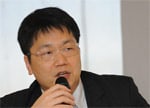
JACK WANG
is executive vice president of Chinatrust. Before joining Chinatrust in 2003, Mr Wang held senior positions in a number of real estate companies—including his role as managing director, China, for Gazeley Ltd, a UK company that was formerly a wholly owned subsidiary of Wal-Mart. He holds a master’s degree in engineering from the University of British Columbia in Canada.
Jack Wang, executive vice president, Chinatrust: In the last quarter of 2011, manufacturing inventory was down, because of a slowdown in accounts receivable and working capital accumulation. But now, manufacturers seem to have a more positive perspective of the global economy, so we are seeing some rebound.
Fiano: What impact will the recent reelection of president Ma Ying-jeou have on economic and trade policy?
Phoo: Taiwan can start to attract longer-term foreign investment with more political stability, but China has an election as well this year, which could cause more instability. That could attract inflows into Taiwanese equities, which could help confidence, but those inflows are likely to be short-term.
Hsu: Many people interpret president Ma’s successful reelection as an approval of his handling of cross-strait relations and therefore expect further liberalization of cross-strait economic policies during his second term.
We have indeed seen some policy changes recently concerning direct investment in Taiwan by mainland entities. As of January 2012, Chinese FDI in Taiwan only came to $270 million, a mere 0.24% of the $112.5 billion invested by Taiwan entities in the mainland. Our government has reportedly put forward an expanded list of permissible direct investments. This would gradually bring a bit more balance into cross-strait investments.
Lin: Lower tariffs for export products will help grow Taiwan’s exports to China, while the soon-to-be-signed Cross-Strait Investment Protection Agreement will safeguard Taiwanese investment in China, including that of Taiwanese banks, and attract Chinese and foreign investment to Taiwan.
Moreover, January’s reelection will also keep our broader economic policy consistent. This year, Taiwan expects to welcome 5,000 Chinese tourists per day, and individual Chinese tourists will be allowed to travel to eight more cities in Taiwan. This will support tourism and increase employment in the service industry, which has been hit by weaker external demand.
Ler-Ming Su, managing director, Land Bank of Taiwan: We are very happy about the election result, because the ruling party has a very clear policy to develop Taiwan’s economy. The government needs to finish major ongoing public construction projects that we are backing, which will improve living standards for the Taiwanese people.
Also, my bank has already established a branch office in Shanghai, and in its first year, we earned over $1 million. We have a great opportunity to make more money from China and have applied for a second branch office in Tianjin. If the government had changed, that may not have been possible.
Fiano: We’ve already touched on the global slowdown, and especially the European problems. What are the medium-term risks for Taiwan’s economy that is clearly export-oriented?
Phoo: Over the last 10 years, Taiwan has generally underperformed many Asian economies, particularly Hong Kong, Korea and Singapore. If Taiwan is to outperform in the medium term, I think the current policies of opening up to China and allowing an increase of bilateral flow between Taiwan and China will help.
We also need to move up the value-added chain in manufacturing. Korean companies have upgraded themselves over the last decade by building strong brand names. I think Taiwan should shift away from original-equipment and original-design manufacturing towards original-brand manufacturing. I think we probably need a lot more regulatory and policy changes to help Taiwanese companies make this transformation.
Taiwan may also have to redefine its relationship with China. We are so used to using China as a low-cost export production base that we have not developed alternatives at home. With the current US slowdown and the European recession, China could become an important end market itself.
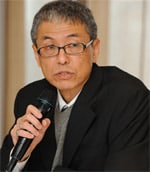
T.Y. Lin
is the director general of economic research at the Central Bank of the Republic of China (Taiwan). He has held various roles at the Central Bank since first joining in 1988, including deputy director general, adviser, New York office representative and assistant director general. He holds a PhD in economics from the University of Southern California, a master’s degree in economics from Oklahoma State University and a bachelor’s degree in economics from Soochow University in Taiwan.
Rick Lo, vice president, macroeconomic research, Fubon Financial Holding: We don’t have the manufacturing advantage anymore, and I believe the service sector will be Taiwan’s growth engine in the future. In 2011, the service-sector-output-to-GDP ratio was 68.6% in Taiwan and 43.1% in China, so both have a lot of growth potential.
With China’s new development model focusing on domestic demand, its service sector will grow rapidly. Because we speak the same language and share the same cultural background, we have a great opportunity to export financial services, cultural and creative services, medical care and orthopedics, tourism and recreation, and transportation and logistics there.
In my view, Taiwan’s trade negotiations with China should focus more on liberalizing the trade of services, not real products.
Hsu: I think developing trade in services is indeed an option for Taiwan, and we saw the early signs of some movement in that direction last year. According to Taiwan Central Bank, within the trade in services category, travel receipts and travel payments in 2011 amounted to $11.0 billion and $10.1 billion, respectively, producing a surplus of $930 million—the first such surplus in history. This was primarily due to the fact that Taiwan began allowing mainland tourists to visit in 2010, and in 2011 began letting them come as free independent travelers.
Lin: Taiwan’s direct exports to the US and Europe account for over 20% of total exports, with more indirectly exported via China. Given the recent debt crisis, we must think about how we can redirect Taiwan’s development to mitigate such external impacts.
We also suffer from an over-concentration in some export products, mainly information and communications technology, so our growth is more volatile than other Asian economies’.The government is trying to boost both domestic demand and the exports market to sustain economic growth. The problem is how to do that, but focusing on China as an end market is a very reasonable direction.
Fiano: The Economic Cooperation Framework Agreement (ECFA) has now been in place for two years. What have been the main benefits for trade and cross-trade between Taiwan and mainland China, and what are your future expectations?
Phoo: Any initiatives that help Taiwanese enterprises to integrate with the Chinese economy should be welcomed, and the ECFA agreement is the correct first step. Nonetheless, the agreement currently covers less than 15% of trade between Taiwan and mainland China.
Right now trade is also very one-sided, so we have yet to see a significant contribution to the Taiwanese economy. Any steps to make things smoother on both sides should be welcomed. If more goods traded between Taiwan and China were granted preferential or zero tariffs, that could also attract more foreign investors that consider Taiwan a springboard into China.
Lin: In the first year of ECFA, only 13% of products on the “early harvest list” were exempt from tariffs. This year as much as 95% will be exempt. Also, the government will speed up ECFA follow-up talks on the trade of goods and services, investment protection and dispute settlement, as well as cross-strait cooperation on industry development and investment.
Since the ECFA was signed, economic and trade relations on both sides of the Taiwan Strait have improved considerably. Taiwan has also signed an investment agreement with Japan. Negotiations for an economic cooperation agreement with Singapore are in progress, and New Zealand, the Philippines, and India are also interested.
Hsu: Following a second round of ECFA tariff reductions that took effect on January 1 this year, about 95% of all items on the “early harvest list” now enjoy zero tariffs, and tariffs on the remaining items will fall to zero in 2013. As the impact of the ECFA begins to kick in, I would expect the positive benefits to become more apparent in the future.
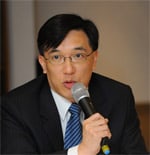
Rick Lo
is the director of macro research of Fubon Financial. He received his PhD in economics from University of Pittsburgh. Before he joined Fubon Financial in 2005, he was an associate professor of economics at National Dong Hwa University (Taiwan).
Lo: When Hong Kong signed the CEPA with China in 2003, it almost took two years to start to help the Hong Kong economy, so things won’t get better in a short time. China is also a very tough negotiator, so unless our government opens up more, I don’t think there will be significant progress.
Fiano: What is the status of the housing market in Taiwan?
Su: In Taiwan, there has never been a housing market bubble. For two to three years, the housing market fell, more houses were for sale, and people were not able to pay their loans, strongly impacting the banks.
But now the housing market is prosperous again, and house prices are very expensive, especially in and around Taipei. The government announced a measure that prevents construction companies that borrow from banks from manipulating housing prices in Taiwan. Taiwan’s Financial Supervisory Commission has imposed a ceiling amount, so that construction company loans can only account for 52.64% of a bank’s lending portfolio.
Pho o : If you look at the price-income ratio across Taiwan, it is in the low teens now, which is a record high. But the high prices are concentrated around Taipei. Further south, in Taichung or even Kaohsiung, the price-income ratio is still in single digits. So discussing whether there is a housing bubble really depends on the segment, the market and the region. Unfortunately, mortgages make up a big chunk of the portfolio of Taiwan’s banking sector, and many jobs have been created in construction and real estate in the last five years, so housing market distress could cause problems.
However, I think there has to be substantial speculative activity and leverage to cause a residential housing market bubble. Household debt is over 80% of GDP, so we need to be aware of that, but the central bank has done a very good job in deterring speculative activity. Nevertheless, Taiwan’s city populations will continue to grow, and if supply does not catch up fast enough, prices might overheat.
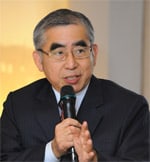
Ler-Ming Su
is the president of the Land Bank of Taiwan. Prior to this position, he held various posts with the ministry of finance in Taiwan, including director general of the National Treasury Agency, director general of the financial data center, commissioner of the securities exchange commission, director and delegate to the Central American Bank for Economic Integration, and division director for the SEC. He holds a master’s degree in business administration from the National Chenkong University, Taiwan.
Hsu: In terms of supply, nearly 30,000 building permits were issued in 2010, up 45% from the previous year. Therefore, I expect the supply of finished homes on the market to increase this year and next. The volume of housing transactions has dropped off significantly since the ministry of finance released the so-called “luxury tax” in February 2011.
This year the participation of short-term investors will decrease. The government’s promotion of “residential justice” and the expected launch this July 1 of a system for recording actual real estate transaction prices are both intended to dampen housing prices, so the probability of further steep appreciation in housing prices has been greatly reduced.
Lin: I believe banks in Taiwan are very careful about their loans in general and housing lending in particular. I don’t really see a big issue for Taiwan’s housing market if we compare it to the subprime issues in the United States or what happened in Japan in the 1990s.
Still, we need to be proactive. The Specifically Selected Goods and Services Tax imposed last January has helped to cool the housing market, especially for urban areas like Taipei. Since June 2010, the central bank has implemented new regulations on housing loans and land-collateralized loans and urged other banks to improve risk management related to real estate lending, so bank real estate lending has gradually slowed down. Regulations have also been approved that require housing sale prices, rather than appraised values, to be registered, to increase price transparency.
Lo: If nothing happens in the Middle East, then hot money will rush in to emerging markets in April or July. All Asian central banks have to work very hard to prevent a property bubble, and it is coming. Taiwan’s housing market will also change dramatically over the next five years, as most of the one million people who moved from China to Taiwan in 1949 will no longer be with us, which will create more housing supply.
Fiano: You have mentioned that ECFA allows Taiwanese banks to open branches in mainland China, and vice versa. What are the opportunities? And will more competition from Chinese banks within Taiwan be a challenge?
Hsu: Cross-strait exchanges among financial services firms will move to a new phase this year. Six Taiwan banks already have established branches in the mainland. During the first half of 2012, these branches will have completed a full year in business with net profits in the mainland, which will qualify them to begin conducting renminbi business for Taiwan-invested businesses operating in the mainland. Another five Taiwan banks, including the Bank of Taiwan, will set up mainland branches this year.
In the meantime, two mainland Chinese banks have obtained permission from the financial regulator to establish branches in Taipei. In the near future, we’ll start seeing storefront signs in Taipei for banks from mainland China. Even so, Taiwan’s competent authorities will be very cautious in opening up Taiwan’s market, so I wouldn’t expect the arrival of mainland Chinese banks to bring significant changes to the financial environment.
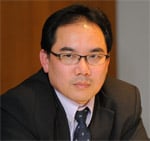
Tony Phoo
is an economist at Standard Chartered Bank in Taiwan. He has 10 years of economic research experience in Taiwan and Singapore. He was senior economist for the fixed-income department with Capital Securities Corp between 2003 and 2006. Prior to that, he hsd similar responsibilities in economic research with the Development Bank of Singapore and Overseas Chinese Banking Corporation. Mr Phoo holds a master degree in international economics, banking and finance from University of Wales, Cardiff (UWCC), and obtained his honors degree in economics with University of London, UK.
Su: I was asked by some of the commissioners from the financial supervisory authority if we were worried about the competition if a huge bank from mainland China opened a branch office in Taiwan, and I told them we aren’t. My attitude is to be open as possible, because if we stop them investing in Taiwan, they will stop us in China, and we can make more money there than they can here.
We are very confident that we can win the competition here and in China, because we are very close to Taiwanese investors in China. Most of them are already our customers here in Taiwan. But our final goal is not to make loans just to Taiwanese investors in China but also to local companies.
Lin: There are many opportunities for Taiwanese banks in China. They are more competitive in areas generating fee income (such as wealth management services), SME financial services, retail banking, financial services for rural villages and so on. They might even take equity stakes or form strategic alliances with Chinese banks, which could lower operational risks and costs.
Lo: There are already 37 domestic banks and 28 foreign banks in Taiwan. On some blocks, you can find more banks than convenience stores. The over-banking phenomenon is quite severe. For example, our profit margin is only just over 100 basis points in Taiwan, whereas at our new Xiamen branch, it is almost 500 basis points. Taiwan’s banks have survived severe competitions for 20 years, so we are not afraid of Chinese banks. We don’t believe Chinese banks are truly interested in Taiwan’s competitive market anyway—they just want to demonstrate they finally have a presence here.
Fiano: Can foreign investors in Taiwan compensate for the decrease in exports?
Lo: At the end of 2011, our foreign reserves amounted to $386 billion, the fourth-largest in the world. We can no longer absorb that amount of capital domestically, so there is a chance for Taiwan to transform itself from a product-exporting country to a capital-exporting country.
Our government should encourage our people to use the accumulated fortune more wisely instead of passing out tax breaks and special treatments to attract more foreign investment.



